Does Socialization Impact a Cat's Sleeping Patterns?
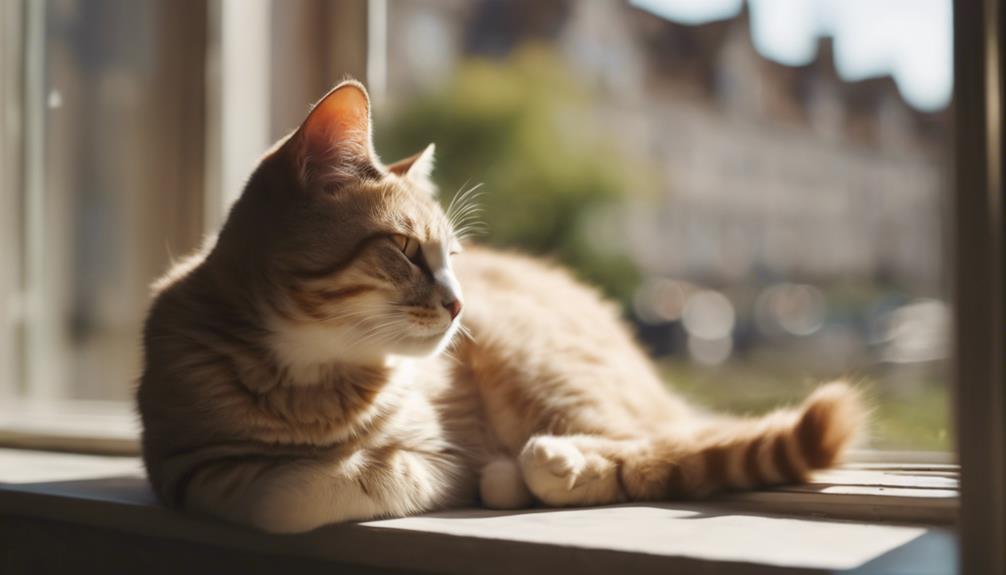
Socialization plays a significant role in shaping a cat's sleeping patterns. Cats that are well socialized tend to feel more secure and comfortable in their environment, which can lead to better quality sleep. On the other hand, cats that are not adequately socialized may experience stress and anxiety, which can disrupt their sleep patterns.
Proper socialization involves exposing a cat to various people, animals, and environments from a young age. This helps them feel more at ease in different situations and reduces the likelihood of developing behavioral issues that can impact their sleep.
In conclusion, socialization is crucial for a cat's overall well-being, including their sleeping habits. By providing a positive and enriching environment, cat owners can help ensure that their feline companions get the rest they need to stay healthy and happy.
Understanding Cat Socialization
Understanding cat socialization plays a crucial role in shaping the behavior and habits of domestic felines. Feline friendships are a significant aspect of socialization in cats. Cats develop bonds with other felines, which can influence their overall behavior, including their sleeping patterns.
When cats have strong feline friendships, they may exhibit more social sleepiness, where they prefer to nap or rest together with their feline companions. This social sleepiness is a result of the comfort and security that these feline friendships provide. Cats that are well-socialized tend to feel more at ease in their environment, leading to more relaxed and restful sleeping patterns.
Furthermore, socialization not only impacts how cats interact with other felines but also influences their interactions with humans. Cats that are socialized early on are more likely to be comfortable around people, leading to positive human-cat relationships. This highlights the importance of early socialization in shaping a cat's behavior and overall well-being.
Effects of Human Interaction

Human interaction plays a crucial role in shaping a cat's sleeping patterns. The level of bonding between a cat and its human can directly impact the quality and quantity of sleep the cat gets.
Additionally, regular social stimulation from human interaction can influence a cat's overall emotional well-being and, subsequently, its sleep habits.
Human Bonding and Sleep
Interacting with humans can significantly influence a cat's sleeping patterns, affecting both the duration and quality of their rest. Cats that bond closely with their human companions often exhibit improved sleep quality due to feelings of security and comfort. This bonding benefits the cat's overall well-being and can lead to a more relaxed state conducive to better sleep.
Moreover, cats that have positive interactions with humans during the day tend to experience less stress and anxiety, promoting deeper and more restful sleep. Additionally, the presence of a familiar human scent or the sound of a soothing voice can create a calming environment that enhances the cat's ability to fall asleep and stay asleep peacefully.
Social Stimulation Influence
The social stimulation provided by human interaction plays a crucial role in shaping a cat's behavioral responses and overall well-being, including their sleep patterns. Cats that receive regular and positive human interaction tend to exhibit more positive behavioral changes, such as increased playfulness, reduced aggression, and improved social skills. These behavioral changes can directly impact their sleep patterns, as a cat that's well-socialized and content is more likely to experience restful and uninterrupted sleep.
Human interaction can also help in establishing a routine that aligns with the cat's natural sleep-wake cycle, leading to better quality sleep. Therefore, ensuring adequate social stimulation through human interaction is essential for promoting healthy behavioral patterns and improving the sleep quality of cats.
Emotional Connection Impact
An emotional bond between a cat and its caregiver significantly influences the feline's behavioral responses and sleep patterns. When a cat feels emotionally connected to its human companion, it can positively impact the quality of the cat's sleep.
This emotional bonding can lead to a sense of security and comfort, promoting relaxation and reducing stress levels in the cat, ultimately improving its overall sleep quality. Additionally, attachment behavior exhibited by the cat, such as seeking physical closeness or purring when near its caregiver, can contribute to more restful sleep patterns.
The emotional connection between a cat and its human can create a harmonious environment that supports the cat's well-being and enhances its sleeping habits.
Impact of Multi-Cat Environment
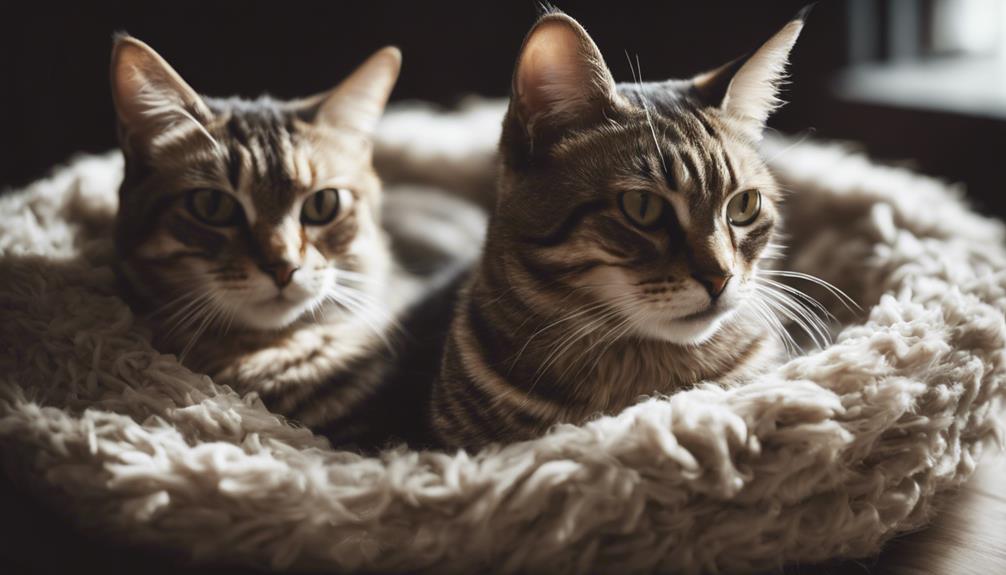
The presence of multiple cats in a shared environment can significantly influence individual feline sleeping patterns. Group dynamics play a crucial role in determining when and where cats choose to rest.
Sleep synchronization within cat groups can be observed, with cats often adjusting their sleep-wake cycles to align with their companions. Additionally, social hierarchy effects may impact how cats interact and find comfort in sleeping arrangements within a multi-cat setting.
Group Dynamic Influences
Within a multi-cat environment, the interactions between feline companions significantly influence each cat's sleeping patterns. The group dynamic plays a crucial role in shaping the sleep dynamics and behavioral patterns of individual cats. Here are some key influences:
- Social Hierarchy: Dominant cats may dictate the group's sleeping locations and times, affecting others' patterns.
- Playful Interactions: Active play sessions within the group can lead to increased rest times afterward.
- Comfort and Security: Cats may adjust their sleeping behaviors to align with the group for a sense of safety and companionship.
Understanding these group dynamic influences can provide insights into how cats adapt their sleeping routines within a multi-cat environment, showcasing the interconnected nature of their behaviors.
Sleep Synchronization in Groups
In multi-cat environments, cats often synchronize their sleeping patterns to align with the group dynamics and social interactions. This synchronization of sleep patterns in groups of cats is a fascinating behavior that showcases their social adaptability.
Cats living together tend to adjust their individual sleep-wake cycles to match those of other cats in the group. This alignment in sleep patterns within a multi-cat environment can be attributed to the cats' inherent social nature and the need for companionship and security.
Group dynamics play a crucial role in shaping these synchronized sleep patterns, highlighting the importance of social interactions among cats. Understanding how cats adjust their sleep behaviors in relation to group dynamics provides valuable insights into their social cognition and adaptive mechanisms.
Social Hierarchy Effects
Cats in multi-cat environments exhibit distinct social hierarchy effects that influence their sleeping patterns and behaviors. Social dynamics play a crucial role in shaping how cats interact and coexist within a group, ultimately impacting their rest habits.
Hierarchical relationships among felines can significantly affect the way they sleep, determining who gets to rest in preferred spots or access resources like food and water. This hierarchy can lead to certain cats experiencing more stress, affecting their sleep quality and duration.
Understanding these dynamics is essential for ensuring all cats in a multi-cat environment have the opportunity to rest adequately and peacefully, promoting their overall well-being and minimizing potential conflicts.
Role of Playtime in Sleep
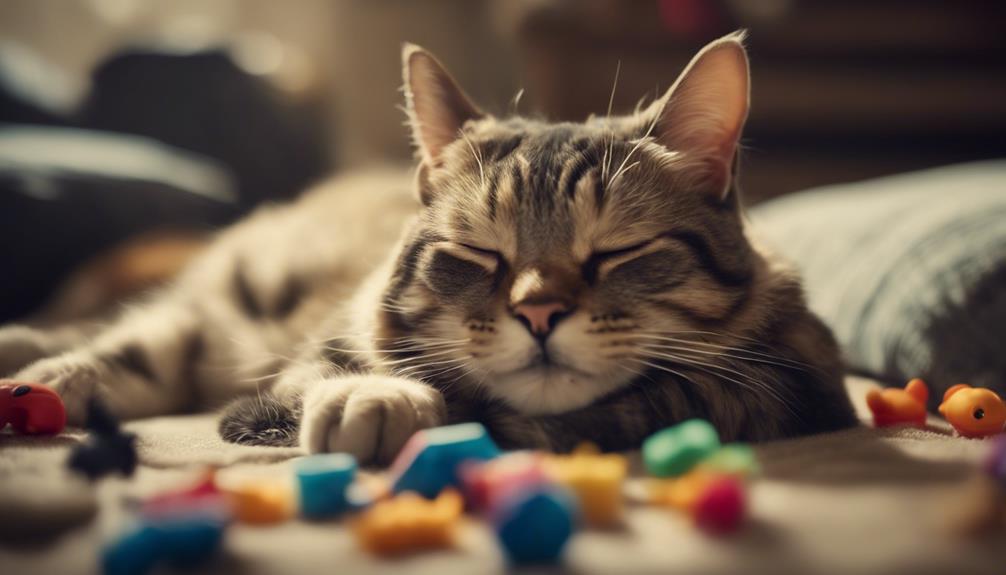
Playtime plays a crucial role in influencing a cat's sleep patterns and overall behavior. Engaging in regular play sessions provides numerous benefits that directly impact a cat's sleep quality. Cats are natural hunters, and playtime helps simulate this behavior, keeping them mentally stimulated and physically active. This mental and physical stimulation during play helps regulate their energy levels, making it easier for them to settle down and rest when it's time to sleep.
Incorporating playtime into a cat's daily routine establishes an exercise routine that can contribute to more consistent sleep patterns. Cats that engage in interactive play during the day are more likely to experience deeper and more restful sleep at night. This structured approach to play and rest helps promote a healthy balance in their daily activities, leading to improved overall well-being.
Therefore, ensuring that a cat receives adequate playtime not only benefits their physical health but also positively influences their sleep patterns, contributing to a happier and more content feline companion.
Routine and Consistency Importance
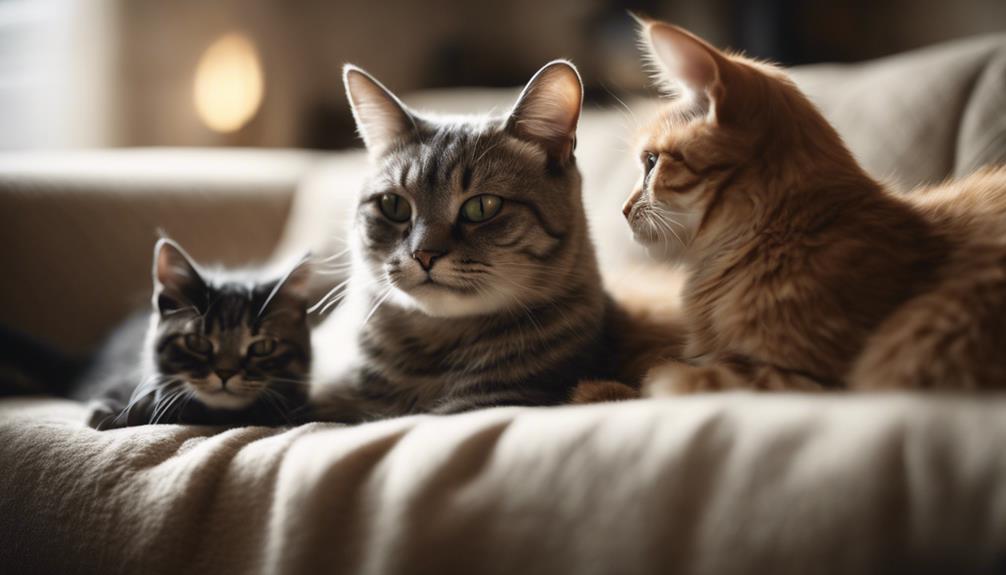
Consistency and routine play a significant role in shaping a cat's sleep patterns and overall well-being. Cats are creatures of habit, and establishing a consistent daily routine can greatly impact their sleep quality and health. Here are key points highlighting the importance of sleep consistency and routine in a cat's life:
- Establishing a regular bedtime: Just like humans, cats benefit from having a set bedtime. This helps regulate their internal clock and promotes better sleep quality.
- Consistent feeding times: Feeding your cat at the same times each day not only helps maintain their energy levels but also contributes to a predictable routine that can aid in their overall well-being.
- Creating a cozy sleeping environment: Providing a comfortable and consistent sleeping space for your cat can help them feel secure and relaxed, promoting better sleep patterns.
Signs of Socialization on Sleep
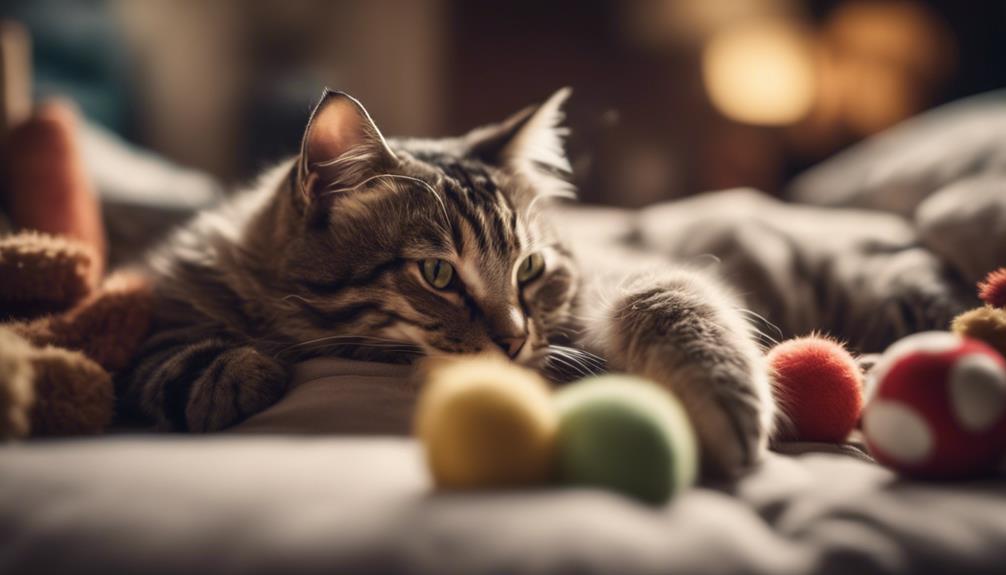
The level of socialization a cat experiences can significantly influence its sleeping patterns and behaviors. Socialization plays a crucial role in determining a cat's sleep quality and duration. Cats that are well-socialized tend to exhibit better sleep quality, often characterized by longer periods of deep sleep and fewer disturbances during rest. On the other hand, cats with limited socialization may experience more fragmented sleep patterns, leading to reduced sleep quality.
| Signs of Socialization on Sleep | |
|---|---|
| Sleep Quality | Cats with high socialization levels tend to have better sleep quality. They show fewer disruptions during rest. |
| Sleep Duration | Well-socialized cats often enjoy longer periods of deep sleep compared to less socialized cats. |
| Interaction | Socialization positively impacts a cat's interaction with its environment, leading to more peaceful sleep. |
Understanding these signs of socialization on a cat's sleep can help pet owners provide the necessary environment and interactions to promote healthy sleeping patterns for their feline companions.
Creating a Social Sleep Environment
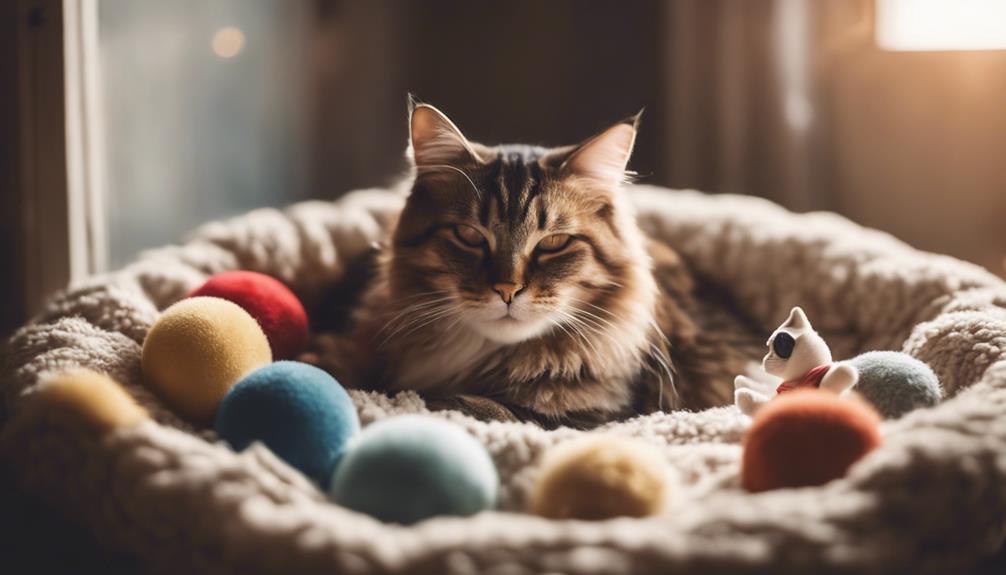
Establishing a conducive social sleep environment for a cat involves ensuring adequate comfort and familiarity in its sleeping area. Cats are creatures of habit and thrive in environments that offer a sense of security and relaxation. When it comes to creating a social sleep environment for a cat, incorporating elements of sleep companionship and a comfortable zone is crucial for their well-being.
- Sleep Companionship: Providing a soft, cozy bed where your cat can snuggle up close to another pet or even a favorite toy can help create a sense of companionship during sleep time.
- Comfort Zone: Cats have specific preferences when it comes to their sleeping spots. Ensuring the sleeping area is warm, quiet, and free from disturbances will help them feel secure and comfortable.
- Bonding Rituals: Engaging in bonding rituals before bedtime, such as gentle petting or interactive play, can help strengthen the bond between you and your cat, promoting a sense of security and trust.
Frequently Asked Questions
Can a Cat's Sleeping Patterns Be Impacted by Socialization With Other Animals Besides Cats?
Interspecies socialization can impact a cat's sleep cycles. When exposed to other animals, cats may experience a stress response leading to behavioral changes, potentially affecting their sleeping patterns. Understanding these interactions is crucial for feline well-being.
How Does a Cat's Socialization History Before Adoption Affect Their Sleeping Habits?
Prior to adoption, a cat's socialization history significantly shapes their sleep behavior. Positive pre-adoption experiences foster healthy sleep habits, whereas negative encounters may lead to disruptions in sleep quality and patterns, impacting the cat's overall well-being.
Are There Specific Breeds of Cats That Are More or Less Affected by Socialization on Their Sleep?
Certain cat breeds exhibit genetic predispositions that influence their sleep habits. Environmental factors such as socialization can impact a cat's sleep quality. While all cats may be affected, breeds like Siamese are known to be more social and potentially influenced by socialization.
Can a Lack of Socialization Lead to Sleep Disturbances in Cats?
Lack of socialization in cats can result in behavioral changes, leading to stress that may impact sleep quality. A well-socialized cat is more likely to have a peaceful environment conducive to restful sleep patterns.
How Does Socialization Impact a Cat's Ability to Adjust to Changes in Their Sleep Routine?
Socialization plays a crucial role in a cat's ability to adjust their sleep routine. For instance, a well-socialized cat is more likely to adapt to changes in their sleep environment and behavior due to positive social interactions and a stable routine.










